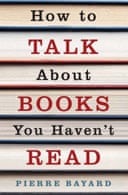How to Talk About Books You Haven't Read
by Pierre Bayard; translated by Jeffrey Mehlman
Granta £12, pp185
Pierre Bayard is a Paris-based professor of French literature. As such, he is a practised charlatan, a literary bullshitter, a professional 'non-reader'. 'Because I teach literature at university level,' he says, regretfully, 'there is, in fact, no way to avoid commenting on books that most of the time I haven't even opened.'
Bayard is infiltrating a 'forbidden subject', an area equivalent to 'finance and sex' in its secrecy. Despite society's 'worship' of reading, he avers, we are most of us heathens, even among the literary elite. And quite right, too: why waste time reading Joyce and Proust when you can talk about them - or skim the work of others? Taking it as given that no one actually reads for the pleasure of the process, Bayard proceeds to investigate the meaning of bibliographic cultural capital.
'Non-reading' for Bayard, is 'a genuine activity'. It implies an engagement with literature and is different from mere 'absence of reading'. A 'true reader' is simply 'one who cares about being able to reflect on literature'. With so little time and so many books, he argues, it is better to spread the net wide and settle for a general sense of the multitude.
Bayard invokes Paul Valery - 'that master of non-reading' - who, rather like Oscar Wilde, claimed the critic depends 'neither on the author nor the text'. Readers must be creative, for to read is to interpret which is also, by necessity, to write. Just as Flaubert once wrote a book 'about nothing,' so, too, should the 'true reader' be able to opine about nothing. Excessive reading, for Valery, 'stripped France of its individuality'.
Bayard's approach is Derridean: a focus on the relation between objects and the systems that support these. He perceives books themselves as a 'system', important only in so far as they are received within society: the gossip that they generate; the ideas that they spawn; the conflicts that they provoke. 'Relations among ideas are far more important than the ideas themselves,' he insists. Thus, it is only ever necessary to get a rough sense of what any particular book is about - and where to place it in the 'collective library'.
This is particularly true given the frailties of subjectivity. Each reader is haunted by their 'inner book' - 'the set of mythic representations... that come between the reader and any new piece of writing'. Then come the problems of memory. Bayard leads us, via Montaigne, to the somewhat undergraduate argument that to read is inevitably to forget. 'At this point, saying we have read a book becomes essentially a form of metonymy.'
Bayard revels in the power of mistelling; he mischievously introduces inaccuracies into his summaries of novels by Umberto Eco, David Lodge and Graham Greene. When he later confesses to this, he remains unrepentant: 'I invented nothing... I was uttering a subjective truth.'
Bayard's tone is relentlessly tongue in cheek; it rests on the supposition that what he is saying is very naughty. Culture, he sniggers, is 'a theatre charged with concealing individual ignorance'. There is something deliciously French about all this: where else, we may wonder, would you risk such disapprobation at the insistence on the intellectual short cut? Bayard refers to 'the oppressive image of cultural literacy without gaps'.This is a peculiar worry: does anyone actually believe in it?
Bayard has produced a witty and provocative monograph with a serious point and a rallying cry: 'We must profoundly transform our relationship to books.' His guilt-free approach to literature is an attractive one and stretches beyond his ostensible subject: often, when he uses the word 'book', this could just as well be substituted for 'experience.' Despite his predisposition, he offers entertaining close readings (some of them accurate) on a range of writers, taking in Robert Musil, Balzac and Shakespeare, as well as Groundhog Day. He has a tendency to complicate the obvious and his urbanity is occasionally annoying - he should not be taken at face value - but you should judge for yourself: despite what Bayard might tell you, How To Talk About Books You Haven't Read is above all worth the read.
